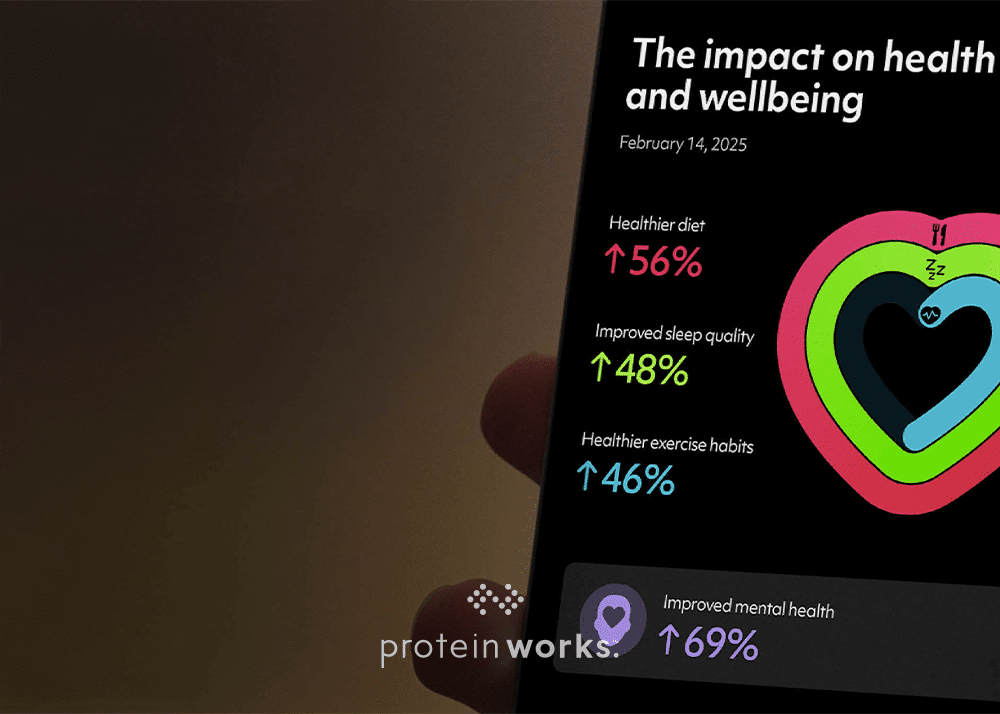
Is Brain Training the New Frontier of Wellness and Longevity in Britain?
Longevity is the health buzzword for 2025. However, the conversation remains centred on physical well-being, ignoring a vital aspect of ageing. Our minds. It’s all well and good to be able to move independently; however, without being cognitively sharp, the quality of those years is severely diminished. Therefore, to truly age gracefully, investing in our brain health deserves as much, if not more, attention.
Most people understand the value of supplementing for our physical strength, but far fewer consider what the brain requires to stay sharp. This matters because our latest survey of 1,002 adults shows that more than half of Brits are worried about cognitive decline, yet few are actively taking steps to protect themselves, especially against modern world conveniences.
At the same time, supplements are booming. Creatine, in particular, has become one of the most in-demand products on the market. Global searches now reach over 10 million per month, with interest growing 47% in the past year alone and trending consistently upwards over the last five years. But there’s a twist: while creatine is widely associated with gym gains and muscle performance, a shocking 87% of people don’t know it also plays a critical role in brain health.
With popularity comes misconceptions. Right now, creatine sits at a crossroads where it’s celebrated as a powerhouse for athletes, but overlooked as a potential ally for the everyday mind. It’s the hidden player in the wellness conversation, and science suggests it may be just as important for cognitive resilience as it is for physical performance.
 The ageing dilemma: What the UK fears most about ageing vs what we’re actually doing about it
The ageing dilemma: What the UK fears most about ageing vs what we’re actually doing about it
With longevity at the forefront of everyone’s mind, we asked the UK what they feared most about ageing. Our survey highlighted just how deeply brain health resonates with people. Losing memory and cognitive ability (52%) was revealed to be the second most feared aspect of ageing – almost as much as losing physical mobility (54%), and more than other issues, such as:
- Needing care from others (40%)
- Changes in appearance (26%)
- Loneliness or social isolation (21%)
- Financial insecurity (19%)
These findings spotlight that memory and mental sharpness are as central to our sense of independence as physical health. However, while many of us are worried, fewer are taking active steps to protect cognitive resilience. In fact, our study found that only 34% of Brits are actively participating in brain training. This mindset, however, is counterintuitive. If brain health is one of our greatest fears, it must also become one of our greatest priorities.
Why protecting your brain adds years to your life
Brain health isn’t just about avoiding forgetfulness; it’s about staying sharp, independent, and full of energy as the years go by.
Recent research 4,5 into “biological brain age” shows just how powerful the connection is:
- People with youthful brains have a 40% lower risk of death and a 74% reduced risk of developing Alzheimer’s.
- By contrast, those with aged brains face a 182% higher risk of death.
By supporting brain health, you’re not only protecting your memory, but also boosting your ability to enjoy life fully: to stay independent, connected, and energised for the future. A younger brain means more years but more importantly, better years.
With this in mind, we explored who and where in the UK are seemingly the most forgetful and need to start prioritising their brain health today.
The UK’s most forgetful generations and cities: Who needs to start prioritising their brain health?
When it comes to geography, the UK’s forgetfulness capital was revealed to be Manchester, where over a quarter of residents admit to being regularly forgetful, from anniversaries and birthdays to login details. Belfast secures second place as the most forgetful city, followed by Bristol, securing third place.

Here’s where each generation struggles the most:
- Millennials: Top the charts for forgetting appointments (71%), names of colleagues (70%), and even keys, wallets, or phones (72%).
- Gen Z: Not far behind, with 66% forgetting meetings and 70% misplacing essentials.
- Gen X: Particularly forgetful with appointments (45%) and colleagues’ names (45%).
- Baby Boomers: More likely to slip on passwords (81%), but otherwise the most consistent at remembering personal events.
This analysis raises an important question: why are younger generations seemingly the most forgetful, and which lifestyle factors might be hindering their ability to remember the everyday details?
From ChatGPT to sedentary jobs: Is modern life ruining our brains?
The modern world is far from the society Baby Boomers grew up in. Convenience is at the tips of our fingers, and the findings from the survey raised some very valid concerns. Why are we seeing high levels of forgetfulness among the younger generations? The answer may lie in the pressures and habits of modern life.
Our survey reveals several key contradictions which may explain why younger generations are struggling with remembering the smaller everyday details:
- Sedentary lifestyles: A large majority (75%) of people sit for long periods daily, a habit linked to reduced blood flow and cognitive decline.
- AI reliance: Nearly 40% of people now use AI tools or games weekly to solve problems. But if outsourcing thinking becomes the norm, it could weaken the very mental muscles we’re trying to strengthen.
- Doomscrolling: Half of respondents admit to doomscrolling weekly, spending hours passively consuming negative content.
- Generational split: Forgetfulness among Millennials and Gen Z is more prevalent, as they lean most heavily on digital shortcuts like AI and social media
Dr. Blen Tesfu (MD), physician and MPH candidate in Epidemiology, explains why these behaviours matter:
“Becoming too dependent on AI tools may lessen the mental exercise of problem-solving that is necessary for building memory and cognitive resilience. When problem-solving is outsourced too often, the areas of the brain responsible for recall and reasoning may become under-stimulated.
“Doomscrolling may raise stress hormones and fragment attention, neutralising any potential benefits from brain training. When attention is constantly distracted, the capacity for deep focus and recollection diminishes.”
The tension is clear: modern conveniences can both train and rot our brains. The outcome depends on the balance we strike between shortcuts and sustained mental effort and whether we create the conditions for real cognitive resilience.
Fighting convenience: How younger generations are leading the brain-training revolution
Despite the rise of AI and modern-day conveniences, the evidence is clear: people want to fight back against the mental shortcuts of modern-day life. Search data shows a boom in demand for digital tools designed to sharpen memory, logic, and problem-solving skills, seeing demand for “brain training games” on the App Store surge by 229% over the past year. Other key demands include:
-
- “Puzzles for adults” skyrocketed 4,500%
- “Crossword puzzle free” spiked 997%
- “Chess with friends” (+833%)
- “Brain training games” (+229%)
- “Sudoku – online game” (+200%)
- And perhaps most strikingly, “solitaire the game” surged by an extraordinary 92,900%
And the generation leading this brain training revolution is Gen Z!
Despite being revealed to be the second most forgetful generation and the ones most exposed to modern-day conveniences like AI, social media, and digital aids, the study found Gen Z are the ones fighting back. Paradoxically, the data shows they are the generation prioritising cognitive fitness, even in a world designed for convenience.
When looking at who is engaging most in brain training games and the likely driving force behind its sudden surge, our generational breakdown reveals a clear leader. Gen Z came out on top, with 46% on average engaging with brain-training tools, from Wordle to brain apps, making cognitive workouts a part of their daily routines. Millennials follow closely at 41%, while Gen X (20%) and Baby Boomers (22%) lean more heavily on traditional puzzles like crosswords and Sudoku.
This shift is more than just entertainment; it’s cultural. For younger generations, brain training has become a lifestyle habit, tied to focus, stress relief, and long-term cognitive resilience, fighting against the convenience of modern-day life. For older generations, it reflects familiarity with timeless formats often found in the newspaper.
Why does this matter? Brain games act like targeted workouts for the mind, engaging memory, logic, and problem-solving skills to support neuroplasticity and cognitive agility. In short, just like muscles, the brain benefits from consistent training.
How to support your cognitive health through supplements, nutrition and exercise
Let’s make this clear. Creatine is not just for your muscles, but for your mind!
One of the biggest misconceptions in the health and wellness industry at the moment is that creatine is only for building muscle. However, science shows creatine supports memory and cognitive function. Creatine supplementation can reduce mental fatigue in tasks requiring sustained concentration, while protecting against age-related decline such as dementia by supporting cellular resilience. This dual effect, boosting everyday cognitive performance and potentially offering long-term neuroprotection, makes creatine uniquely placed to bridge the gap between physical vitality and mental sharpness.
And yet awareness is low: only 13% of people associate creatine with brain health. At a time when cognitive decline is one of our greatest fears, this gap represents a powerful opportunity to reframe how we think about protecting the mind.
At the same time, our diets and exercise habits are evolving as they become less about appearance and more about purpose. Nutrition is now as much about sharper focus and brain resilience as it is about weight or muscle. Foods rich in omega-3s, antioxidants, and healthy fats are increasingly valued for supporting memory, mood, and long-term brain health. Likewise, exercise isn’t only for strength or fitness, but for longevity by boosting blood flow, reducing inflammation, and protecting cognitive health.

Despite this, we found more than 1 in 4 Brits say they wouldn’t commit to an eight-week brain-boosting habit, even though memory loss is one of their biggest fears. Encouragingly, 72% say they are at least somewhat likely to try, showing that the desire is there if brain health becomes a natural part of lifestyle.
That means approaching brain health holistically:
- Supplementation: Adding brain-boosting powerhouses like creatine into your everyday routine to help boost cognitive health and function.
- Nutrition: Diets like the MIND diet, built on omega-3-rich fish, berries, leafy greens, nuts, seeds, whole grains, and even dark chocolate, have been shown to slow age-related decline.
- Movement & lifestyle: Practices such as tai chi improve executive function, socialising protects cognition, and just eight weeks of mindfulness can strengthen recall and stress resilience.
Forget Me Not: Protecting your memory starts today
Memory is one of the most precious parts of who we are; yet too often, we leave it to chance. Our data shows that while many of us fear losing cognitive ability, fewer are actively building habits to protect it.
The good news? It doesn’t take a lifetime. An 8-week commitment to meditation can already deliver measurable benefits. Paired with daily creatine supplementation, you can go further: supporting not just muscles, but also memory, focus, and long-term cognitive resilience.
Safeguarding memory should be part of everyday health, as natural as eating well or staying active. While ageing is inevitable, losing yourself to forgetfulness doesn’t have to be.
Creatine isn’t just for muscles; it’s for your mind too. Smarter days begin with Creatine 360 – GOLD Innovation.
Methodology
The findings are drawn from a survey of 1,002 British adults, conducted in September 2025. The sample of respondents reflect the national population, with representation across key demographics such as age, gender, and region.


 The ageing dilemma: What the UK fears most about ageing vs what we’re actually doing about it
The ageing dilemma: What the UK fears most about ageing vs what we’re actually doing about it





